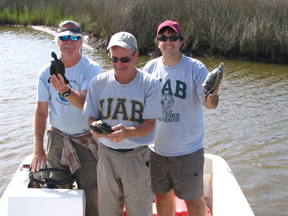 Catastrophe has a way of catalyzing need and resources. The 2010 BP oil spill in the Gulf of Mexico has made University of Alabama (UAB) scientists' expertise in the biomarine environment off their coast particularly valuable. BP has pledge up to $500 Million to study the effects of the spill, and some of that funding is making its way to biomarine research projects at UA-Birmingham through Alabama's Marine Environmental Science Consortium (MESC) and the larger Gulf Research Initiative Open Research Program. The MESC has distributed $5 Million in Rapid Response Funds already, and 16 UAB researchers have received $308,344 in grants to fund pilot projects identified by and applied for at the UAB Gulf Oil Spill Summit last fall.
Catastrophe has a way of catalyzing need and resources. The 2010 BP oil spill in the Gulf of Mexico has made University of Alabama (UAB) scientists' expertise in the biomarine environment off their coast particularly valuable. BP has pledge up to $500 Million to study the effects of the spill, and some of that funding is making its way to biomarine research projects at UA-Birmingham through Alabama's Marine Environmental Science Consortium (MESC) and the larger Gulf Research Initiative Open Research Program. The MESC has distributed $5 Million in Rapid Response Funds already, and 16 UAB researchers have received $308,344 in grants to fund pilot projects identified by and applied for at the UAB Gulf Oil Spill Summit last fall.
[Above photo courtesy of Dauphin Island Sea Lab]
 One funded project is biologist Thane Wibbels' study of terrapin turtle population and habitat. Alabama was able to react more effectively than Louisiana to protect its coastline by erecting booms to keep out oil drifts. That means that Alabama may have the role of supporting endangered marine life like the turtles until they can be released back into the rest of the Delta.
One funded project is biologist Thane Wibbels' study of terrapin turtle population and habitat. Alabama was able to react more effectively than Louisiana to protect its coastline by erecting booms to keep out oil drifts. That means that Alabama may have the role of supporting endangered marine life like the turtles until they can be released back into the rest of the Delta.  Wibbles and fellow marine biologist Ken Marion have studied the Diamondback Terrapin for the past 6 years and will soon be releasing 75 of the 150 turtles they've raised in captivity. They'll be studying the turtle's food chain and breeding grounds in the Alabama salt marshes and assessing population health over the coming years. [Top right photo: UAB Reporter; lower right: Defenders of Wildlife]
Wibbles and fellow marine biologist Ken Marion have studied the Diamondback Terrapin for the past 6 years and will soon be releasing 75 of the 150 turtles they've raised in captivity. They'll be studying the turtle's food chain and breeding grounds in the Alabama salt marshes and assessing population health over the coming years. [Top right photo: UAB Reporter; lower right: Defenders of Wildlife]
Other examples of oil spill research projects in the life sciences funded by UAB and MESC include:
- Chemist Eugenia Kharlampieva's study of biodegradable sponge-like polymeric microparticles for oil removal
- Biologist Douglas Watson's study of endocrine disruption by crude oil and its impact on cellular processes in invertebrate species
- Pharmacologist Stephen Barnes' study of GC-MS instrument upgrades for analyzing oil contaminants in biological samples
Pilot projects are especially important in rapid response situations because they get research started and can set the stage to identify future, more expansive studies.
If you are a supplier of life science laboratory equipment or a UAB researcher, lab manager or purchaser, put August 4 on your calendar and plan to attend the Biotechnology Calendar Birmingham BioResearch Product Faire™ event on the UAB campus. Biotechnology Calendar, Inc. brings life science vendors and researchers together to network and share information about laboratory products, supplies and services on research campuses across the United States.


